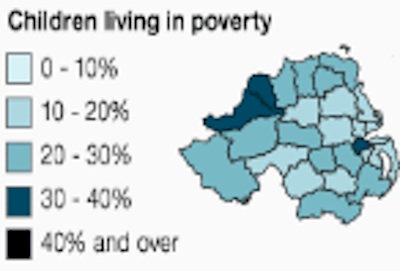
More than four in ten children in West Belfast are living in poverty, it has emerged.
New figures show that the constituency, in which 43 per cent of the children live in poverty, suffers from deeper poverty than any local authority area in Ireland or Britain, except for one ghetto in central Manchester.
Children in other nationalist areas are also faring badly. Although heavily promoted as this year’s ‘UK City of Culture’, Derry is now the fourth most poverty-stricken area for children under British jurisdiction, across either Ireland or Britain.
Nearby Strabane, County Tyrone is another of the most deprived areas. However, figures for wealthy, unionist areas such as Lagan Valley and North Down have as little as 13% of children living in need.
Commenting on the figures, Enver Solomon, Chair of the End Child Poverty campaign said the child poverty map reveals the “gross levels of inequality that children face in every region”.
He said the huge disparities that exist have become more entrenched and are now an enduring reality, as many more children are set to become trapped in long-term poverty and disadvantage.
Leading children’s charity Barnardo’s called on the Stormont administration to do something.
“Behind today’s statistics sit the most vulnerable children in society, whose life chances risk being compromised by our failure to tackle child poverty effectively,” said Lynda Wilson of Barnardo’s.
Nationalist politicians did not blame the poverty figures on continuing discrimination against their community, but described the statistics as a “scandal”.
SDLP councillor Tim Attwood expressed shock at the statistics for his constituency.
“It is unacceptable that the Falls, Shankill and Whiterock wards remain amongst the most deprived wards in the North,” he said. “It is a scandal that life expectancy for men in some parts of west Belfast is ten years less compared to men in parts of south Belfast, which is just a stone’s throw away.”
Sinn Féin’s MP for the west of the city, Paul Maskey, blamed the poverty on past neglect by the British government.
“Low wages, as well as high unemployment, are contributing to the poverty faced by entire communities in west Belfast due to generational neglect by successive British governments,” he said.
JUDICIAL REVIEW
Ongoing discrimation against Catholics was raised in the High Court this week, where the unionist management of the Girdwood housing project was called into question.
For decades, nationalists have complained that unionist politicians have marginalised and ghettoised Catholics, while encouraging the development and expansion of wealthy Protestant communities.
The sprawling new development, on the site of a former British Army base in north Belfast, is to be the subject of a judicial review after a judge accepted concerns over discrimination in the planning of the project.
In court, Barry Macdonald QC pointed out that the DUP Minister Nelson McCausland and party colleague Nigel Dodds had acted in a sectarian manner.
They were “grinning like Cheshire cats” in the publicity photographs for Girdwood, he said. “There is an abundance of evidence giving rise to a reasonable inference that Mr McCausland was indeed motivated by sectarian considerations.
“He has expressed himself in sectarian terms in the recent past and when he comes into office he makes a decision which reflects that.”
![[Irish Republican News]](https://republican-news.org/graphics/title_gifs/rn.gif)
![[Irish Republican News]](https://republican-news.org/graphics/title_gifs/harp.gif)

